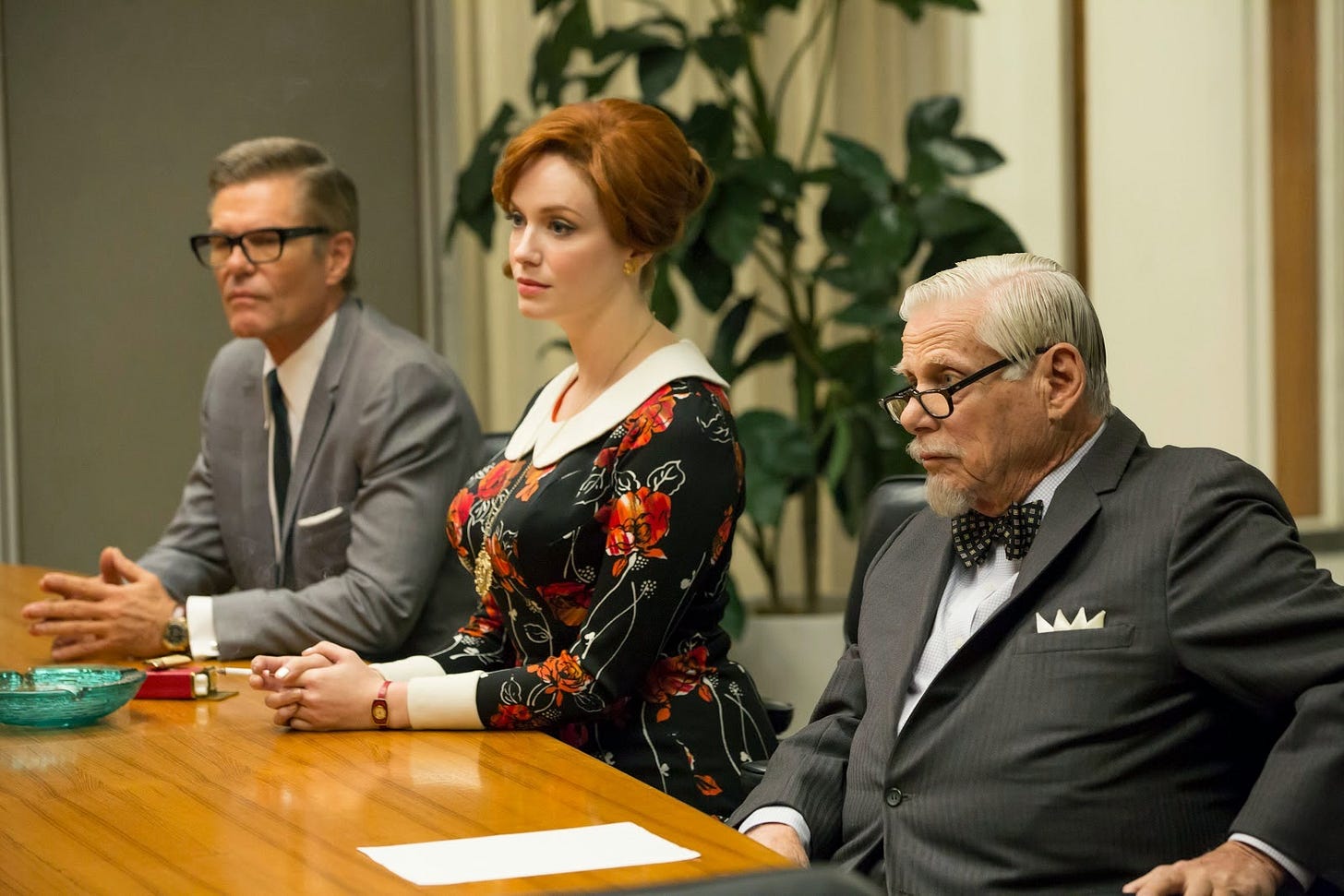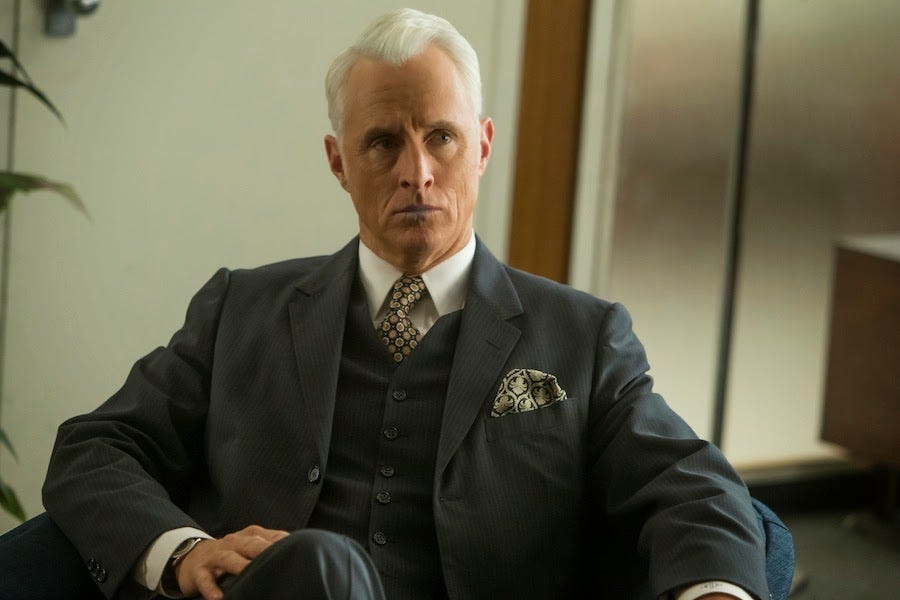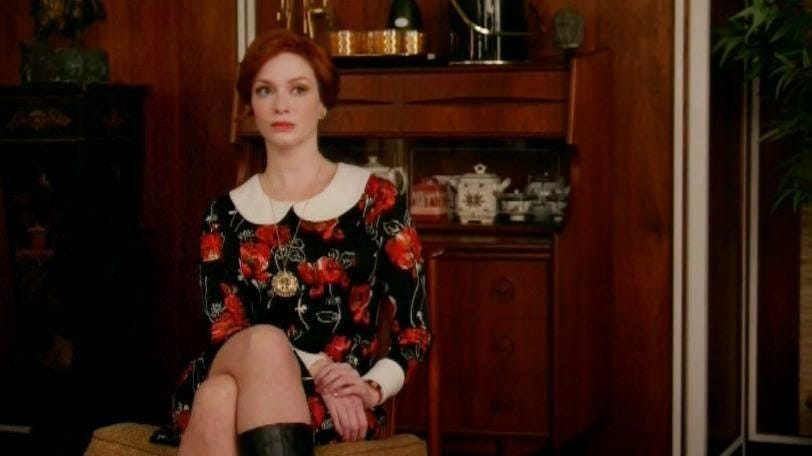"Mad Men" Review: "Field Trip" (Season 7 Episode 3) - "Eat your candy!"

The seventh and final season of Mad Men continues with its third episode, “Field Trip,” and just as always, I have an in-depth review and analysis of the hour for your reading pleasure. To do the episode justice, this review contains spoilers – as always, do not read unless you have seen the episode.
Spoilers for “Field Trip” after the jump...
Bobby: “She really likes you.”
Betty: “Yes, well that blouse says she really likes everyone.”
There is so, so much to discuss in a masterclass Mad Men episode like “Field Trip” – easily the best episode of the season so far, and really, one of my favorite Mad Men hours ever – so many richly realized character moments, so much meaty, gorgeous dialogue, such finely wrought tension and discomfort to every last second of Don Draper’s return to Sterling Cooper & Partners, but I cannot help myself. I have to start with Betty. I have to start with Betty, and I have to give January Jones a giant metaphorical high five, because that glorious, seething one-liner quoted above? That is the hardest I have laughed at Mad Men since “Guy Walks Into An Advertising Agency” (the infamous ‘tractor in the office’ incident), and Mad Men is a show that causes me regular, copious laughter. That might well be the ultimate Betty moment in the history of this show, a perfect, searing distillation of every inch of insecurity, judgment, and conservatism Betty harbors inside her, impeccably paced as an unexpected, forceful grace-note to an otherwise calm, pleasant scene, and flawlessly, beautifully, blisteringly delivered by Jones. The way she briefly flicks her eyes at the teacher’s blouse before making the remark, the simultaneously relaxed and poised way she holds herself while saying it, the pure underlying venom masked by the forced sense of off-handedness, the obvious but sublimated sense of glee she gets from taking the pot shot...by God, that was a magnificent jibe. Matthew Weiner and company may have had trouble writing for Betty over the years – particularly during Seasons 4 and 5 – but Jones has never ceased to be an asset to the series when given good material, and while her work throughout tonight’s episode proved that, her wonderfully underhanded swing at Bobby’s teacher will now and forever be the moment I point people towards when they complain about Betty. No character who gives us an insult that gleefully passive aggressive can possibly be worthless.
And it was only the first of two, because we also got Betty’s scathing, demonic “Eat your candy!” to Bobby later on, which may have been even better in terms of pure, unwarranted intensity. Ms. Jones, I applaud you.
Brilliant one-off Betty moments aside, I feel about her entire subplot this episode the way I do about a lot of supporting characters’ stories at the moment. This was good and interesting, a more than solid reintroduction for Betty this season – with the story clearly demonstrating Betty’s discomfort at being stuck between her own conservative social impulses and the growing encroachment of modernity (Francine her working friend, the teacher not wearing a bra, etc.), this felt entirely germane to the themes of the season premiere – but it also felt undeniably slight. I need to see more of where Betty is and where she is going before I feel I can perform any truly substantive analysis, and the same goes for Pete, and Roger, and Joan, and Dawn, and definitely Peggy, all of whom have been at the center of very good scenes or subplots so far this season, but whose forward momentum remains relatively diffuse right now due to the sheer number of character arcs Mad Men is juggling. The further we get into the season, the more I wish the premiere had been two hours, like in years past, if only so all of these characters could have had a more solid foundation from the outset. As it stands, Weiner has clearly chosen to prioritize Don’s arc over the supporting players, and while that’s resulted in some terrific material for that character and for Jon Hamm, it’s also left virtually everyone else underserved, and has me feeling a little antsy about whether or not the time will exist in these seven episodes (due to AMC’s ridiculous scheduling, we only have four more left after tonight) to service any of them fully. So while “Field Trip” was a pretty overwhelmingly fantastic episode of Mad Men, its greatness came primarily from its handing of Don and his continuing arc of self-improvement – exactly where this season has excelled most up to now – and that doesn’t necessarily assuage any of my (admittedly minor) overarching concerns about the season as a whole.
But dwelling on anything remotely negative seems almost selfish after the cornucopia of dramatic greatness “Field Trip” gave us. I suspect most post-episode analysis will focus on Don’s chaotic return to SCP – as rich, entertaining, and satisfying an extended sequence as Mad Men has ever crafted – but the entire first half of the hour is about Don and Megan’s relationship, and is an absolutely fascinating, heart-wrenching stretch of drama. There has been a lot of push and pull so far this season as to whether or not Don is really trying to change, or is even capable of doing so, but what makes his scenes with Megan hit so hard is that, in trying to do the right thing, he hurts her and their relationship as much, if not more, than he ever did with outright lies – and that’s more or less exactly how his first marriage broke down as well.

Don’s impromptu trip to surprise Megan comes from a good place. After hearing she’s deeply stressed out to the point of manic behavior, Don chooses to visit Megan in person, rather than just making a phone call, and one can sense that, as with many of his actions this season, Don makes the choice because he knows it is what a ‘good’ person would do. He is trying to be a better man – a better father, a better husband – but a lot of it is calculated and forced, not necessarily in a negative way – Don knows he has to rebuild himself from the ground up, starting with the small things, and that begins with consciously forcing himself to make an effort – but in a way that constantly reminds us how far he has to go. And that gesture brightens Megan’s world for a little while – the moment at which he catches her by surprise in her apartment may be the happiest Don has ever made Megan look – until she realizes Don didn’t come solely for the sake of seeing her. It’s the first in a string of exchanges the characters have where the dramatic resonance stems from seeing both points of view so entirely. Don is sincere in the advice he tries to give Megan – advertising is a vastly different world, but he does have some experience with creative rejection – and in his desire to make her feel better, while Megan is certainly justified in feeling upset her husband only wanted to see her in the midst of crisis, not as a purely romantic gesture. She needs to feel wanted, and if Don is there with any level of ulterior motive, even a good-natured one, that undercuts the gesture. Don isn’t intentionally trying to hurt her, nor being particularly insensitive – for once, Don is legitimately concerned about his spouse’s needs – but especially considering that he’s stung Megan too much in the past, been too selfish on too many occasions, this gesture can only seem hollow to her, and Don’s only possible recourse is to start coming clean.
Now, Don’s confession here – that he has been fired, and didn’t tell her because he feels guilty and ashamed (more or less identical to what he told Sally last week) – isn’t nearly as big as what he admitted to Betty back in “The Gypsy and the Hobo,” in part because Don has long since told Megan about Dick Whitman, and never allowed that particular secret to interfere with their relationship. But just as with Betty, it’s not the content of the secret that hurts his spouse so much as what the keeping of the secret says about how Don views the relationship. For Betty, learning about Dick Whitman was paramount to realizing Don never loved or cared about her enough to show her anything more than a front, while for Megan, learning about Don’s firing makes her feel worthless and invisible to him. If Don really loves her, how could he hit rock bottom and lose everything without reaching out to her? Or as she puts it – “With a clear head, you got up every day and decided you didn’t want to be with me.” And as much as Don insists he loves her, as much as he apparently wants to make this marriage work, that logic is too ironclad for him to argue with. No matter what he felt or said on the surface, something was subconsciously keeping him from making the effort he needed to make.

On arriving back in New York, Don tries making that effort, and getting an invitation to return to SCP proves to be so easy, one suspects Don’s heart simply wasn’t in it before. All it takes here is a swift bit of maneuvering with a rival agency and a quick, heated confrontation with Roger – in an absolutely fantastic scene that distills every bit of history Don and Roger have together into one succinct, snappy, beautifully written and performed verbal fist fight, with both men expressing their issues with and admiration for each other in equal measure – and Don has his foot back in the door.
He’s motivated now, because his marriage is truly on the verge of collapse, and he believes that only by fixing every part of himself – including his career, which Don Draper defines so much of himself through – can he prove his love. The brilliance of Jon Hamm’s performance is that even as so many of Don’s actions here are misguided – if he really wants to patch things up with Megan, he needs to go to LA and simply be with her – I believe the earnestness behind every word he says, especially on that late night phone call, because I see here a new dimension for him. Throughout that conversation, there is such a serious attempt being made to be honest, to purge himself emotionally, to explain his feelings, to justify his own actions and hopefully make her understand his shame and regret. “I just thought that if you found out what happened, you wouldn’t look at me in the same way,” he tells her. “I know how I want you to see me.” I believe his intent to change because I understand how hard it would be for the Don Draper we’ve known for six seasons to admit not only his own mistakes, but that he truly values whether or not the people he loves see him as the man he wants to be. Don Draper has had plenty of supposed ‘turnarounds’ before, but this one is different, in part because it’s based in the little gestures, in these personal moments and painful confessions, in this obvious desire to shape himself into someone who doesn’t actively hurt his loved ones (on a smaller scale, this was the theme of his subplot with Sally last week too).

By the time we get to Don’s return to the agency, the character has wrapped up so much personal significance into the visit – equating his ability to actively change with a successful return to the office, and thus hanging his entire personal stability on this one day – that the sequence becomes an extended emotional climax of the highest order. The introduction alone, with Don sitting in his apartment, petrified with nerves, terrified he doesn’t have the strength to do this, all conveyed silently and intercut with his ascent in the elevator, is an absolutely stunning scene, and the episode just rises up and up and up from there. It is a tense, breathlessly paced symphony of discomfort, where every character has their reasons for being enthused, worried, angry, or a little bit of all three. Joan has had a good relationship with Don in the past, but he was too much of a liability for her at the end to welcome him with open arms; Peggy is understandably upset, given how thoroughly Don betrayed her trust and friendship last year, and her cold greeting seems perfectly warranted (“Well, I can’t say that we miss you”); Ginsberg and the other younger members of the staff are eager for Don’s advice and recognition; Roger feels he needs to stick up for his friend, if only because he knows Don at another agency can only be bad for SCP, while Cutler, power-hungry though he may be, has every right to distrust Don after everything he put the new agency through last year; and then there’s Don himself, stranded in the middle of the office waiting for Roger to return (and then for an actual meeting to be convened), weathering his own nerves and unease as well as he can, his relative composure only making everybody else more uncomfortable in the process.
At the point Don finally walks into the conference room with the partners, the tension is almost unbearably palpable – as much meaning as Don has assigned to this moment, everyone else has, over the course of the day, loaded it with significance too, and the structural genius of “Field Trip” is that everybody’s perspective is crystal clear when Don walks into that room. The tension seems ready to snap when Cooper reads out the long, humiliating list of stipulations – Don won’t be allowed to be alone with clients, he’ll need to stick to a pre-approved script, he cannot drink, he’ll be given Lane’s old office, and worst of all, he’ll be reporting to Lou – but instead of putting up a fight, Don only smiles and says “Okay.” No hesitation, no internal conflict – Don has so much riding on this attempt to recapture his career that arguing isn’t even in the cards. When he says “Okay,” it’s clear that he would do whatever he had to do to get back in the agency, would take any deal offered, because he has something to prove, to himself as much as anyone else, and nothing the partners can say is going to deter him. It’s a shocking, piercing moment, not just for the partners (we don’t get a reverse shot, but I assume everybody’s jaws just dropped), but for the audience as well. Even if we believe Don is trying to better himself, that simple “Okay” suggests a level of commitment few would reasonably predict.
Is it a positive sign? Maybe. Don subjecting himself to strict outside discipline suggests an equally rigorous internal restraint, and that is a step in the right direction - this is a case of him refusing to play the hobo and run. But this career and this agency have almost always been toxic for Don Draper, an atmosphere perfectly tuned to push his worst buttons (last week’s episode was yet another reminder of what a venomous world SCP is for everyone else as well), and it simply can’t be healthy for Don to be pursuing acceptance in this world with such dogged determinacy. That little “Okay” is a brilliant, powerful closing moment because it suggests so many things about the mental state of this character, about his past and future, about his wants and desires, about his inner and outer selves – it is Mad Men in a nutshell, complex and challenging, thoughtful and rich, entertaining and surprising, all in one moment. That final shot, and “Field Trip” as a whole, is television’s greatest drama at its glorious best.
Follow author Jonathan Lack on Twitter @JonathanLack.
Mad Men reviews post every Sunday night, an hour or two after the episode airs. Come back next week for my thoughts on the season’s third episode, “Field Trip.”
Read All Season 7 Mad Men Reviews:
#1 – “Time Zones”
#2 – “A Day’s Work”

